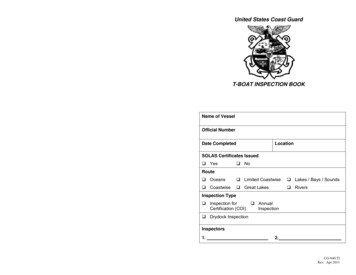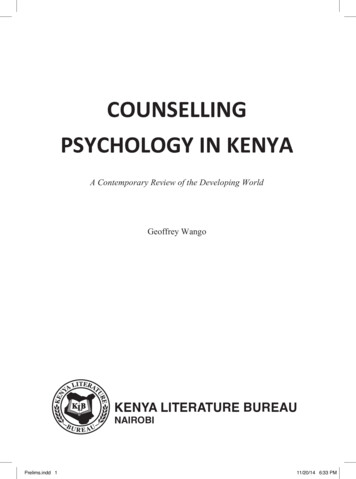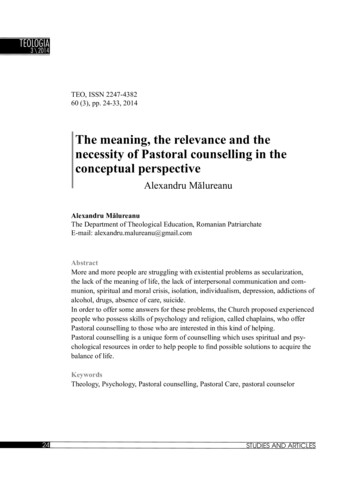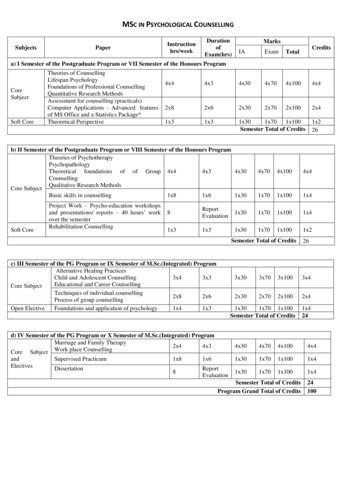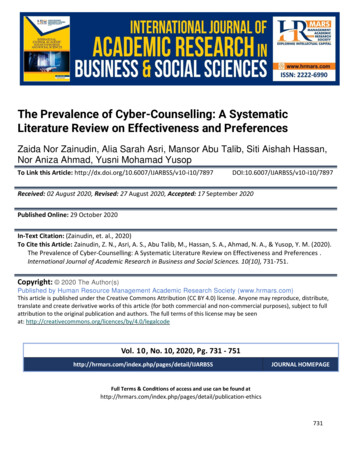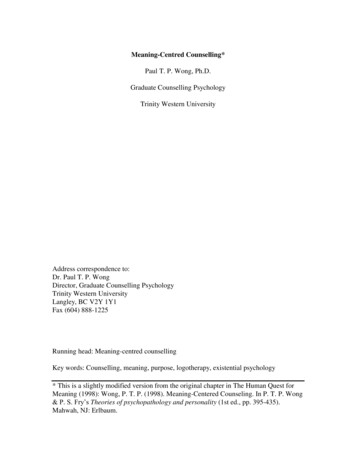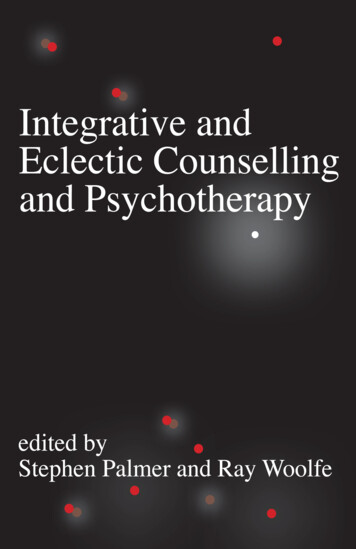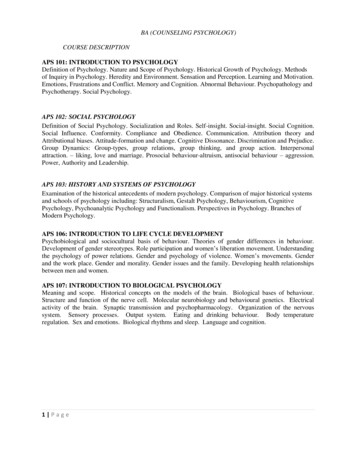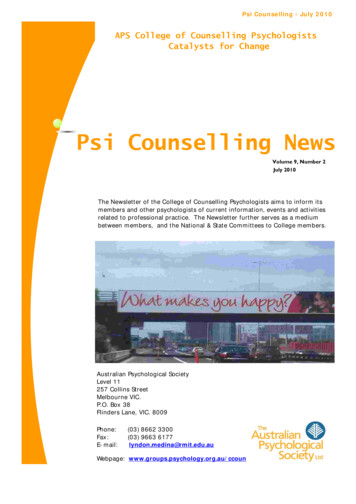
Transcription
Psi Counselling - July 2010APS College of Counselling PsychologistsCatalysts for ChangePsi Counselling NewsVolume 9, Number 2July 2010The Newsletter of the College of Counselling Psychologists aims to inform itsmembers and other psychologists of current information, events and activitiesrelated to professional practice. The Newsletter further serves as a mediumbetween members, and the National & State Committees to College members.Australian Psychological SocietyLevel 11257 Collins StreetMelbourne VIC.P.O. Box 38Flinders Lane, VIC. 8009Phone:Fax:E-mail:(03) 8662 3300(03) 9663 6177lyndon.medina@rmit.edu.auWebpage: www.groups.psychology.org.au/ccoun
Psi Counselling - July 2010In This Issue:Editorial Policy2Editor’s Note3Chairs Report - National & State4Membership Report8College Webpage9Professional Self Care10Member’s Section11Practice Issues14Professional Development Report20Professional Development21Office Bearers & Contact Details38Committee Meetings39State Committee Members39Editorial PolicyAims and ObjectivesThe Newsletter of the APS College of Counselling Psychologists is produced by the National Executive of theCollege in collaboration with State Committee sections. Its target audience is College members. It serves as a meansfor communication for members and as a publicity tool for the Society in the public arena. It promotes the work ofCounselling Psychologists, provides a forum for discussion and keeps members aware of forthcoming events andimportant issues in the field of Counselling Psychology.ContentsNewsletter contents will vary from issue to issue but will attempt to include editorial comment, a National Chair’sreport, State Branch Chairs reports, training activities, professional practice issues, membership surveys, APS newsand advertising.ContributionsThe Editorial Board encourages College members to contribute articles to the Newsletter. Effort will be made toensure publication of all articles submitted but publication of articles cannot be guaranteed. The Editorial Boardreproduces in good faith information sent for inclusion in the Newsletter. It accepts no responsibility for thecorrectness or otherwise of information included in the articles presented nor does it necessarily endorse the viewsexpressed in printed articles. It respects the rights to freedom of thoughts and speech and encourages active debateamongst members.Material for inclusion in the Newsletter is to be submitted to the Editor by the relevant deadline, 28 February;30 June; and 31 October. Submissions are preferred to be in electronic format (Word document) and should bebetween 500-800 words. Submission can be emailed to lyndon.medina@rmit.edu.auAdvertisingAdvertising in the Newsletter is welcome. Rates are available on application. Placement of an advertisement is not anendorsement of the advertiser. Approval of advertising rests with the Editorial Board.SubscriptionMembers of the APS College of Counselling Psychologists will automatically receive the new edition ofPsi Counselling News via email as part of their membership. Mental health practitioners and other allied healthprofessionals may receive the Newsletter by subscribing and being on the College email list.Send your request to lyndon.medina@rmit.edu.au2
Psi Counselling - July 2010Editor’s NotesIt does not seem that long ago when I first produced the March edition of theNewsletter, but in reality over three months has actually passed. Within that three monthsmany changes have happened both personally and professionally. The most significantchange in our profession came into effect on 01 July 2010, when the National Registrationcommenced and new practice guidelines from the Psychologist Board of Australia wasdeclared. These shift include mandatory professional insurance, use of specialist title orarea of practice endorsement, continuing professional development hours instead of points,recommendation for 10 hours peer consultation per year, develop learning plan and so forth.The next preoccupation in our profession seems to be the ICAP (InternationalCongress of Applied Psychology) Conference scheduled on 11-16 July. Looking at the list ofpresentations, half day and full day workshops, and keynote, I believe that any professionaldevelopment ’enthusiast’ will be deeply gratified. It’s a pity that I have spent my CPDallowance for the year already.At the College level, the ‘wind of change’ has also affected the ‘busyness’ ofCollege members and Committee members. I have been asked by several psychologist to bea proposer/ seconder for College membership application and APS full membership. In thisissue, you will read more on membership from Maria Pirrello’s report; Elaine Hosie providesan inspiring report; and College State Chairs providing an update on counselling psychologyin their locality. Michael Di Mattia and the Victorian committee has done a great deal ofwork organising the College State Conference and have managed to invite ProfessorErnesto Spinelli to present the key note, as well as doing two workshops for the College inNovember.With changes almost behind us, I wonder whether ‘that is all’ at the moment. Itwould be nice to catch up with the readings, to familiarise myself with the new guidelines,review journal articles for knowledge, and/or finish the remaining five books I have beenreading concurrently. Perhaps, most of all I would love to go up to the mountains.Inasmuch as I would love to have some downtime, however, I am worried of beingcomplacent even for just a minute, as I’m sure in a ’blink of an eye’, I would have alreadyfallen behind.Speaking of ’behinds’, I have just received an sms/text from the AustralianTaxation Office (new communication initiative) reminding me that it is tax time. So much for‘slowing down’, I better attend to this, so bye for now, and I hope you enjoy the July 2010edition of Psi Counselling News, and I look forward to your contribution on the November2010 edition.Lyndon MedinaTHINKING GREENTo promote sustainable thinking and practice, the Psi Counselling News is designedto be viewed onscreen. It can be saved on a memory stick, CD or a computer’s harddisk. It is suitable for printing, but please consider printing only the necessary pagesrequired. Consider also printing on both sides of the paper.3
Psi Counselling - July 2010Chair’s ReportHas Counselling Psychology come of age yet? This is a question I am often asked along with‘what is it that counseling psychologists do’. I am not about to attempt to answer these questions in thisforum but I would say is that neither is a question about which we can become complacent. As soon aswe pause to pat ourselves on the back about our achievements another issue for counseling psychologyand the profession of psychology emerges in these times of such rapid change. The profession ofpsychology along with the entire health sector is facing significant change brought about by the newnational registration guidelines, just three days away as a write this article.Counselling Psychology has been recognized as an endorsed area of specialist practice ofpsychology under the national registration guidelines placing us firmly alongside the other specialties' ofclinical, clinical neuropsychology, organizational, sports, educational & developmental and forensicpsychology as the seven acknowledged areas of specialist endorsed psychological practice. Our heartfeltconcerns go to our colleagues in health and community psychology whose areas of practice are yet to beacknowledged as endorsed specialities in the new national registration guidelines. We wish them well intheir endeavours to gain acknowledgement.The breadth of practice and talent within our ranks of counseling psychology is impressive,evidenced in the last edition of the Psi Counselling News. As a snapshot of the work of counselingpsychologists the March edition of the newsletter made reference to narrative therapy, working withbullying in the workplace, research on motivational interviewing, process experiential emotion focusedpsychotherapy, supervision, existential practice and psychotherapy and not least the beautiful poetryillustrating the humanistic practice of counseling psychologists. All this in just one edition givesevidence to the array of interventions in the practice of counseling psychologists. I was heartenedrecently when a client stated ‘I have had heaps of counseling and you are the first person who haslistened and talked to ME.’ I think that comment encapsulates that which is held dear to the practice ofcounseling psychology.IT is timely to remind you of the opening sentences of the latest brochure of the College ofCounselling Psychology which states that ‘Counselling psychologists are specialists in the provisionof psychological therapy’. They provide psychological assessment and psychotherapy for individuals,couples, families, and groups and treat a wide range of psychological problems and mental healthdisorders. Counselling psychologists use a variety of evidence-based therapeutic strategies and haveparticular expertise in tailoring these to meet the specific and varying needs of clients’.At this juncture I wish to make special mention of Ben Mullings from WA, student member of theNational Executive of the College since 2008 who recently resigned from this position on the NE. I thankBen for his tireless research, attention to detail and exacting analysis and response to documents in thepolitical arena. His work directly assisted in steering the direction taken by the NE in recent years. Thankyou Ben for your efforts for the College. I welcome Adam Becker from Latrobe University as the newstudent representative on the National Executive of the COCP.I also want to make special mention of the death of Dr Jim Penney, a very long standing member of theCollege and advocate for counseling psychology. We send our condolences to his family and friends.My sincere thanks go to the editor of Psi Counselling News, Lyndon Medina for producing such aninteresting newsletter.Elaine HosieNational ChairpersonCollege of Counselling Psychologists4
Psi Counselling - July 2010Chair’s ReportWestern Australia SectionDuring 2009-10 there has been a focus on national registration and all the issues attached toit. In WA the College has supported the specialist debate but not very actively. Our experience in WAwas that specialisations only served to divide rather than unite and the current response of somemembers of the profession is proof however, in spite of this, or because of this, the CounsellingCollege in WA has and continues to work towards unity in the profession. To this end the College isco-ordinating a state conference to be held during Psychology Week – “Recognising Unity in theDiversity of the Profession”. The aim of the conference is to bring together the nine Colleges; eachCollege will present a 1 ½ hr workshop that will attract Level 2 PD points on that day. This is a firstof such events to bring all psychologists together.We continue with our PR with doctors and the public. During Psychology Week last year, and plannedagain this year, we have a display at a couple of big shopping centres which are mainly manned byCounselling Psychologists.Little by little we are growing in numbers and although still small we make a difference in the West.Lidia GenoveseVictorian SectionThe Victorian state committee meets on a monthly basis, with lively discussions on the currentissues in psychology and in particular those affecting counselling psychologists. The upcomingchanges for the profession of psychology and the implications for counselling psychology hasprovided much impetus for our discussions. One aspect of the committee’s work is organisingprofessional development for our members, which continue to be well attended, with a number ofevents taking place over recent months. The PD calendar for the second half of this year offersdiversity for members, including a workshop on eating disorders and body image, working withsexual issues in couples counselling, two training opportunities with Professor Ernesto Spinelli andthe state conference.The conference organising committee has finalised the program for our inaugural stateconference and are delighted with the quality and diversity of submissions received, believing we haveput together a program that showcases the breath of practice and research in counselling psychology.What is pleasing about the conference is the diversity of members presenting, with a number of ruralpractitioners and postgraduate counselling psychology students presenting papers.The marketing subcommittee, under the leadership of Lyndon Medina, has been active inredesigning a number of our key marketing tools, including a new design for our college bookmark.Whilst the slogan “Catalysts for change” remains, there is also an alternative bookmark with theslogan “Specialists in psychological therapy”, emphasising one of the key skills of our specialisation.The new design is now incorporated into the PD certificates which will be used at all future collegeworkshops. The marketing subcommittee intends on developing strategies to market the expertise ofcounselling psychologists to other psychologists, health providers and the general public.Michael Di Mattia5
Psi Counselling - July 2010Chair’s ReportNew South Wales SectionThis past year the committee has continued to meet approximately every two months. We have beengrateful to Maria Pirello for her hospitality for most of our meetings. Our country member on the committeefrom Grafton, Catherine Eastwood joins us via Skype (when we can get it to work efficiently) or via teleconferencing. Our other committee member from The Illawarra, Wollongong is Arch Tibben who attends as often aspossible.Maria of all the committee members has probably been the busiest in the last few months dealing withthe increase in interest in membership of the College. The deadline of June 30 for all applicants wantingmembership and therefore endorsement under the new PBA guidelines has been demanding for many of us.We hope it bears fruition in an increase in membership.At the beginning of this year we made a decision to limit the number of professional developmentactivities we would run ourselves. There were two reasons for that decision. Firstly the Sydney branch is veryactive in sponsoring PD activities and secondly the International Conference of Applied Psychology and anumber of other professional development opportunities. This suggested to us that with the busy lives mostmembers live and the cost of professional development in time and money we would organise something atthe beginning and end of the year. We have promoted the seminar by Dr Robert Neimeyer on ‘Grief, loss andthe quest for meaning’ as a very worthwhile PD activity to attend and which will attract specialist points forCollege members. He is an excellent communicator. Katherine Johnson was very enterprising in that shemanaged to get a reduced fee for College members in NSW. The other activity is the visit to Sydney ofProfessor Ernesto Spinelli in November which a number of college members indicated an interest in attending.This is being sponsored by the Centre of Existential Practice in Sydney in co junction with the CounsellingCollege in Victoria.The professional development activity which we ran in April was with Dr Geoff Denham.The topic was ‘Investigating the effectiveness of your practice. Toward client responsive tracking of therapeuticoutcomes’. All those present valued highly Geoff’s presentation. It is also good to use the skills of colleagueswhen planning professional development activities. Our meeting at the end of the year and Christmas activityis to be finalised at our next committee meeting. At the request/urging of the National Executive I joined theForum which met in Sydney to look at ‘Multidisciplinary work force within rehabilitation’. Two other APSmembers from the Clinical College were also present. They have presented a proposal to the government inresponse to the draft National Rehabilitation Strategy and this was favourably received. It was followed up witha face to face meeting in Canberra where they were given positive feedback and suggestions forward. APS wasa willing signatory to the proposal and it will be interesting to see the outcome. Because of being overseas inMay I was not able to attend the most recent meeting and gain a further up date.We continually raise the question about the need to provide more activities in the rural sector but asyet the opportunity to plan something definite has alluded us. At a personal level as chairperson I am hopingmy life will be less demanding when hopefully I submit my PhD in October. That may make my life more flexible and able to move round the state more readily. The makeup of the committee remains unchanged sincelast year, namely: Geoffrey Glassock (Chairperson), Wendy Buchanan (Secretary), Thomas Schick (Treasurer),and Committee members: Maria Pirello, Catherine Eastwood, Katherine Johnson,Francesco Lopizzo, and Arch Tibben.Dr. Geoffrey Glassock, OAM6
Psi Counselling - July 2010Chair’s ReportQueensland SectionA small group of members continue to promote activities of the College in South EastQueensland. We are presently operating without the services of a treasurer and appeals to membershave so far gone unanswered. One of the challenges in Queensland relates to the distance many ofthe members are from the Brisbane city area.Professional DevelopmentDuring the past nine months we have conducted a number of seminars with invited guestspeakers, including:1.2.3.4.Dr Robert Schweitzer on Therapist EfficacyDr Elizabeth Tindle in conjunction with the Women and Psychology Interest groupVivian Jarrott on Therapists Perceptions of Mental IllnessOwen Pershouse on Dealing with Male Clients in Relationship CrisisThese events are generally well attended by a broad range of practitioners, students and,at times, other allied health workers. A recent challenge has been the distribution of event flyersthrough the APS to local psychologists. We are looking into ways to improve that communication.Additional topics being planned for the coming months include dementia, supervision, personalitydisorders and working with teens.Commencement of Counselling Masters at UQThe multi-specialty Masters program that commenced at University of Queensland in 2009achieved accreditation. The concept provides for Masters in Counselling, Health and Sport with apercentage of the work being combined and specialty areas managed separately.ThanksI would like to express my thanks to all members of the local committee – Nicole, Elizabeth andDoreen.Jo EhrlichHave you seen Viktor Frankl’s DVDs?These2 DVDs are available for loan by College members from the VictorianSection of the APS College of Counselling Psychologists, at the cost ofPostage & Handling.Download “Order Form” from the College Members Media ntent.aspx?ID 1874 oremail Jan Seeley at janseeley@yahoo.com7
Psi Counselling - July 2010Membership ReportMembership of the Counselling College stands at 643 as at 31/5/2010. This figure is notdissimilar to 2009. The figures for 2009 reflected renewals just prior to the Annual APS conference inOctober whereas the figure of 643 in May 2010 indicates current membership prior to the annual renewalperiod. I believe that the actual membership figures for the College in 2010 will be much higher at thenext census date in August 2010. There are several factors operating here.In 2009 the downward trend appeared to stabilise and College numbers started to increase. Thisincreased interest in College membership was in part a result of the leveling out of the Medicare factorand the introduction of mandatory PD for general APS membership. I believe this encouraged manyex-College members to have their membership reinstated. A second contributing factor was the increasein the number of Counselling Courses at university level. These Courses require lecturers in the Programto be members of the College at the same time it is also providing a pool of student members who willbecome full members of the College at graduation.The interest in College membership gathered momentum during 2010 driven by the uncertaintyaround the requirements of the Psychologist Board of Australia (PBA). The announcement by the PBA ofSpecialist endorsement for College members was announced in early June with a deadline of 24 June.Potential applicants were given a short window of opportunity to apply for College Membership. Thisdeadline created an avalanche of enquiries and applications. The further announcement of the closing ofthe 4 2 pathway by the PBA also galvanized many older APS members who had come in via the old 4 2route into action. Lapsed College members also rushed to have their membership reinstated. The lack ofany transitional arrangements by the PBA added further stress to the already overloaded APS office andmembership committees rushing to process applications in time to meet the June 24 deadline.Many applicants became frustrated as communication with National Office was shut down due tothe unprecedented number of applications for all the Colleges which flooded National Office .As Membership Chair of the College I was inundated by anxious applicants seeking clarification about thenon standard entry route to College membership; need for a proposer; registration of supervision andreinstatement of College membership. Fortunately the announcement by the PBA of a transitionalarrangements at the eleventh hour gives potential applicants for College membership a new deadline ofthe 30 September 2010.As membership Chair of the College for the last fifteen plus years I have reflected over the manychanges which have occurred both for the College and the APS as a whole. In processing the recentapplications for College membership I have been impressed with the quality, the wealth of knowledgeand experience of the applicants and the applications coming in via the non standard pathway. In manyways it is a pity that it took the PBA to move these APS members to join but I hope in the future that theCollege will grow and prosper as a result of, not only, the increase in membership but from the expertisewithin its ranks. I would hope that these members become active in their various States to make theCollege the leader in the provision of psychological therapy and a force to be reckoned with in theSociety.Maria PirrelloDo you work with couples?This DVD is available for loan by College members from the Victorian Section of theAPS College of Counselling Psychologists, at the cost of Postage & Handling,Download “Order Form” from the College Members Media ntent.aspx?ID 1874 oremail Jan Seeley at janseeley@yahoo.com8
Psi Counselling - July 2010www.groups.psychology.org.au/ccounThe College webpage is full of current information relating to our professional practice,counselling psychology and activities of the National and State Committee. Collegemembers are encouraged to visit the site occasionally and are invited to contribute tothe content of the website. The College webpage was designed to augment andcomplement the Psi Counselling News as well as to provide immediate access toinformation relating to our profession.Current information in the College webpage include: Counselling Psychologists Supervisor’s List Papers by College members, e.g., Vive le difference: Counselling & ClinicalPsychology by Dr. Elizabeth Tindle Subscription & submission to the Australian Journal of Counselling Psychology Response to the Psychology Board of Australia College Online Discussion Forum Victoria Conference - Counselling Psychologists: Experts in Psychological Therapy Member’s Media Library Professional Development activities College Portfolio Groups Previous editions of Psi Counselling News APS College Committee Manual News about Counselling Psychologists Office Bearers contact detailsTo submit material for inclusion on the College webpage, please contactGerard Webster gerard.w@optusnet.com.au - College website coordinator.9
Psi Counselling - July 2010Professional Self CareA journey to remember - Catriona O’NeillI knew I couldn't evade Lyndon's requests for photos forever. It's hard to believe half a year haspassed since my trip to Peru in January. I went on a three-week tour with Intrepid - starting out fromLima on the coast, down to Nazca, gradually making our way up into the Andes and Cuzco, then trekkingthe Inca Trail to Machu Picchu, followed by island stays on Lake Titicaca and finishing in La Paz, Bolivia.My tour group were great fun and I saw lots of amazing things but one of the highlights was definitelythe Inca Trail. So here are 3 photos from that part of the tour.This is me with the big smile!1. Our tour group on the first day of the three-and-a-half day, 45km trek. The men in blue behind uswere our porters for the trip who between them carried almost everything - including food, water, gas,tents, chairs and 6kgs each of luggage for the group. Very fit, and accustomed to the altitude in theAndes, they would be regularly seen running past us heavily laden with huge backpacks. I was impressed,but the trail felt like an achievement for all of us on the trip. The ponchos were for the rain, which it did,on and off for the whole trek. It was summer, but cool. The next photo shows how cold it gets higher inthe Andes.2. The incredible view from our final night's campsite.The next morning we woke around 4am, aiming toget to Machu Picchu by sunrise.3. And here it is - Machu Picchu. The end of theInca Trail for us (we caught a bus then trainback to Cuzco later that day). It is the largestof the Inca sites on the trail, of which severalwere very quiet and beautiful. I picked thisphoto because it makes it look as thoughthere is hardly anyone there (hah!). Which iswhat the trail was like for most of our way lots of solitude, altitude, mist, rain, beautifulscenery, incredible stonework, and incredibleporter-work. Challenging physically andmentally, it was an unforgettable trip.10
Psi Counselling - July 2010Member’s SectionWant to save some lives?Dr. Bob RichThose lives could include your own, and of the people you love. I am talking about climate change.Some otherwise highly intelligent people choose to be ‘climate sceptics.’ Well, some otherwisehighly intelligent people choose to be evolution sceptics. The teaching of evolution is forbidden in someStates of the USA. And yet, there is scientifically absolutely no doubt about evolution. It is a fullyvalidated theory whose predictions are borne out. It is supported by many lines of convergent evidence.Of course, there are growing edges and disagreements in biology, but no controversy at all about thebasic facts. The controversy is only among people with no expertise in biology. The same is true inclimate science.The basic facts about climate change are accepted by 100% of climate scientists. The supposedcontroversy is due to cognitive dissonance, and to people funded by vested interests who misguidedlythink that they can escape the effects. Anyone interested in the evidence can email me atbob@bobswriting.com . My friend Barrie Pittock was the head of the CSIRO Division of Meteorology untilhis retirement in 2008. At my request, he has supplied me with a few short but authoritative summariesof the evidence. I can send you these.The facts beyond dispute are these: Climate change is real. It is occurring, and it can be documented with clear convergingevidence. Climate change is caused by human activities. The rate and magnitude are way too large to beexplained by any natural fluctuations. Climate change can not be prevented. Large-scale, concerted global effort two generations agocould have achieved that, but because of the long time lags, whatever we do now, things willget worse. Climate change has already caused disasters, and will continue to do so. As a single example,the Black Saturday fires on 7th February 2009 were affected by climate change. (There is a FireDanger Index. When it reaches 50, a Total Fireban is announced. The 1983 Ash Wednesdayfires were on a day with FDI in the high 90s. On Black Saturday, it was 150.) Mitigation is possible: we can do things to reduce and delay the effects. Adaptation isnecessary: changes that will reduce the impact on humans and some natural ecosystems.This last point is where psychologists come in. Mitigation and adaptation are only going tohappen if there is widespread attitude change in the whole community. If all humanity goes on a warfooting to work on climate change, we can prevent a whole heap of suffering. As psychologists, we areexperts in inducing attitude change. Therefore, it is our duty to work on it.Your first step could be to join the Psychology and Environment Interest Group.11
Psi Counselling - July 2010Member’s SectionA martini, a medal and medicationTHE TIME HAS COME When the brain is gone, where am I?Where have I gone?Physically present but not at homeI wander.“The time has come” the Intern said,“to talk of many things,Of leaving QUT at last andseeing what life brings.”“A year of tedium toil and tests:A year of this and that.Some boring scoring (and some “jawing”)Administering Beck's or WRAT*.It’s over now. I’m fully fledged.This bird is on the wingI’m now a Psych, so au revoirI’m off to have a fling.”We’re warned by the bean countersOf the escalating cost of care.Focussing on the post- war baby boomersWho’re approaching ‘senility’Are they a burden on the StateOr scarce young tax-payers?Amis* suggests a solution to this “greytsunami”This gaggle of grey nomadsWho roam the Australian outbackOr pack the bingo halls in Britain.No moral dilemma for him.A booth at every street corner forThose who have reached their ration of lifeThree
Counselling Psychology which states that 'Counselling psychologists are specialists in the provision of psychological therapy'. They provide psychological assessment and psychotherapy for individuals, couples, families, and groups and treat a wide range of psychological problems and mental health disorders.
